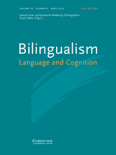
Bilingualism-Language and Cognition
Scope & Guideline
Illuminating the Cognitive Benefits of Bilingualism
Introduction
Aims and Scopes
- Bilingual Language Processing:
This area explores how bilingual individuals process language, including lexical access, sentence production, and comprehension in both first and second languages. - Cognitive Effects of Bilingualism:
Research in this scope investigates the cognitive advantages or disadvantages associated with bilingualism, such as impacts on executive function, memory, and decision-making. - Cross-Linguistic Influence:
Studies examine how knowledge of one language affects the processing and production of another, focusing on phenomena like code-switching and transfer effects. - Neuroscientific Approaches:
This theme includes neuroimaging and electrophysiological studies that investigate the neural correlates of bilingual language processing and the effects of bilingualism on brain structure and function. - Developmental Perspectives:
Research focuses on how bilingualism influences language acquisition and cognitive development in children, including heritage language speakers. - Sociocultural Contexts:
This area considers the social and cultural dimensions of bilingualism, including identity, language use in different contexts, and the implications of bilingualism for social dynamics.
Trending and Emerging
- Emotional and Social Dimensions of Bilingualism:
There is an increasing focus on how bilingualism affects emotional processing, decision-making, and social interactions, highlighting the interplay between language and affect. - Neuroplasticity and Brain Function in Bilinguals:
Research is trending towards understanding how bilingualism influences brain structure and function, particularly in relation to aging and cognitive reserve. - Machine Learning and Computational Approaches:
The use of machine learning and computational modeling to analyze bilingual language processing and individual differences is gaining traction, offering new insights into complex phenomena. - Bilingualism in Diverse Contexts:
Emerging studies are exploring bilingualism in varied sociolinguistic contexts, including heritage language maintenance and multilingual environments, reflecting broader social changes. - Impact of Bilingualism on Cognitive Development:
There is a growing interest in how bilingualism influences cognitive development across the lifespan, particularly in children and in relation to educational outcomes.
Declining or Waning
- Traditional Language Proficiency Assessments:
Research focused solely on standardized language proficiency assessments is waning, as newer studies emphasize the importance of contextual and experiential factors in language use. - Static Models of Bilingualism:
There is a noticeable decline in studies that treat bilingualism as a fixed characteristic, shifting instead to dynamic models that account for variations in language use and proficiency over time. - Comparative Studies of Monolingual vs. Bilingual Performance:
While comparative studies remain relevant, there is a trend away from simplistic comparisons that do not consider the complexities of bilingual experience and context.
Similar Journals
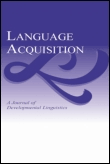
Language Acquisition
Pioneering research at the intersection of linguistics and psychology.Language Acquisition, published by ROUTLEDGE JOURNALS, TAYLOR & FRANCIS LTD, is a leading academic journal dedicated to the interdisciplinary study of language development and acquisition. With an ISSN of 1048-9223 and E-ISSN 1532-7817, this peer-reviewed journal caters to professionals, researchers, and graduate students in the fields of linguistics and educational psychology. The journal boasts an impressive 2023 Scopus ranking of Q1 in Linguistics and Language and Q2 in Education, reflecting its high impact and relevance within academic circles. Notably, it is indexed among the top 15% of journals in Language and Linguistics, showcasing its significance in contributing knowledge to these vibrant fields. Although currently not open access, Language Acquisition makes a profound impact on understanding how individuals acquire language, facilitating discussions on pedagogical strategies, cognitive development, and sociolinguistic factors. The journal's historical and ongoing contributions since its inception in 1990 reinforce its position as a vital resource for advancing research and theory related to language acquisition.

Rivista di Psicolinguistica Applicata-Journal of Applied Psycholinguistics
Transforming Understanding of Human Interaction.Rivista di Psicolinguistica Applicata - Journal of Applied Psycholinguistics is a distinguished journal dedicated to exploring the intersections of psychology and linguistics, making significant contributions across various subfields of psycholinguistics and its applications. Published by Fabrizio Serra Editore in Italy, this journal presents a repository of innovative research, theoretical advancements, and practical applications relevant to developmental and educational psychology, linguistics, and social psychology. Although currently listed in Q4 for Developmental and Educational Psychology and Q4 for Social Psychology, the journal has achieved a respectable Q3 ranking in Linguistics and Language, reflecting its commitment to enhancing understanding within these realms. With an E-ISSN of 1724-0646, the journal facilitates accessibility to its content, empowering scholars and practitioners to stay abreast of emerging trends and findings. The impact factor of the journal is poised for growth as it seeks to amplify its reach and influence within the academic community, appealing to researchers, professionals, and students who have a vested interest in the dynamic field of applied psycholinguistics.
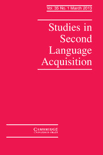
STUDIES IN SECOND LANGUAGE ACQUISITION
Pioneering insights into the art of language acquisition.STUDIES IN SECOND LANGUAGE ACQUISITION, published by Cambridge University Press, is a premier journal dedicated to advancing the field of second language acquisition. With an ISSN of 0272-2631 and an E-ISSN of 1470-1545, this journal has carved its niche as a leading resource for scholars and practitioners alike since 1978. Recognized in Q1 quartiles across both Education and Linguistics and Language, and ranked within the top 2% in its fields according to Scopus, it provides a platform for cutting-edge research that addresses the complexities of language learning and teaching. Although it does not currently offer open access, the journal remains widely accessible through institutional subscriptions, ensuring that groundbreaking research reaches a global audience. With a focus on empirical studies, theoretical discussions, and innovative methodologies, STUDIES IN SECOND LANGUAGE ACQUISITION is essential for those seeking to deepen their understanding of language education, making it a must-read for researchers, educators, and students committed to the evolving landscape of language acquisition.

Psycholinguistics
Fostering Insightful Research in Psycholinguistics.Psycholinguistics is a distinguished academic journal published by the STATE HIGHER EDUCATIONAL ESTABLISHMENT in Ukraine, specializing in the intersection of psychology and language. Since its inception, this journal has transitioned to an Open Access model in 2017, offering unrestricted access to its rich repository of research that contributes to the field's understanding of cognitive processes and linguistic functions. With an impressive Q2 classification in Linguistics and Language and a Q4 classification in Experimental and Cognitive Psychology as of 2023, Psycholinguistics garners significant attention among scholars, evidenced by its notable rankings in Scopus. The journal serves as a vital platform for researchers, professionals, and students, enabling the dissemination of innovative findings and theoretical advancements in psycholinguistics. Its commitment to high-quality scholarship and open access makes it a valuable resource for those engaged in the exploration of language acquisition, processing, and cognitive aspects of linguistic behavior.
Address: VUL SUKHOMLYNSKOHO 30, PEREYASLAV-KHMELNYTSKYI 08400, UKRAINE.
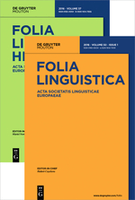
FOLIA LINGUISTICA
Advancing Linguistic Knowledge Since 1967FOLIA LINGUISTICA, published by WALTER DE GRUYTER GMBH, is a premier scholarly journal dedicated to the field of linguistics. Established in 1967, the journal has consistently provided a platform for innovative research and scholarly discourse in language and linguistics, contributing significantly to the academic community's understanding of language structures, usage, and cognitive processes. With its classification in the top quartile (Q1) of linguistics and language in 2023, FOLIA LINGUISTICA holds a respectable rank (#282/1088) within the Arts and Humanities category and an admirable percentile rank of 74th, ensuring its position at the forefront of linguistic scholarship. Researchers and academics from around the globe can access a wealth of knowledge and cutting-edge research findings through this esteemed publication, which is vital for anyone looking to engage with the latest advancements in linguistics. Located in Berlin, Germany, FOLIA LINGUISTICA encompasses all aspects of language research, making it an indispensable resource for researchers, professionals, and students alike seeking to deepen their understanding of language and its complexities.
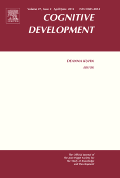
COGNITIVE DEVELOPMENT
Bridging Theory and Practice in Cognitive StudiesCognitive Development is a prestigious academic journal published by Elsevier Science Inc, focusing on the critical area of developmental and cognitive psychology. With an ISSN of 0885-2014 and an E-ISSN of 1879-226X, this journal serves as a vital platform for the dissemination of innovative research, theories, and methodologies from 1986 to the present, with the latest articles contributing to a comprehensive understanding of cognitive processes in children and adolescents. Positioned in the second quartile (Q2) of both the Developmental and Educational Psychology and Experimental and Cognitive Psychology categories, Cognitive Development holds an essential place in shaping contemporary psychological research, boasting robust Scopus rankings of #175/360 and #90/165 in its respective fields. Though not an open-access journal, it provides valuable insights and rigorous studies essential for researchers, professionals, and students engaged in the intricate processes of cognitive development. Whether you're looking to publish significant findings or simply stay updated on the latest advancements, Cognitive Development is an indispensable resource in the psychological community.

Journal of Cultural Cognitive Science
Unlocking the Secrets of Language and ThoughtThe Journal of Cultural Cognitive Science, published by SpringerNature, is an esteemed forum for researchers and scholars dedicated to exploring the intersection of culture, cognition, and language. With its ISSN 2520-100X and E-ISSN 2520-1018, this journal has made significant strides since its inception in 2017, covering a wide array of topics pertinent to Experimental and Cognitive Psychology and Linguistics and Language. Notably, it has achieved remarkable recognition, ranking in the Q3 category for Experimental and Cognitive Psychology and Q1 for Linguistics and Language in 2023. Its Scopus ranks further illustrate its impact, with the journal positioned at the 89th percentile in Social Sciences - Linguistics and Language and 47th percentile in Psychology. Despite its ongoing journey, it continues to foster open dialogue and innovation among professionals, researchers, and students, providing valuable insights and advancing knowledge in the field.

PSYCHOLOGIA
Connecting Minds through Groundbreaking ResearchPSYCHOLOGIA is a distinguished academic journal published by the Psychologia Editorial Office, focusing on the broad field of psychology. Originating from Japan, the journal serves as a platform for innovative research and insights into various psychological phenomena, contributing significantly to the advancement of psychological knowledge since its establishment in 1996. With an ISSN of 0033-2852 and an E-ISSN of 1347-5916, PSYCHOLOGIA primarily targets researchers, professionals, and students who are passionate about the intricacies of human behavior and cognition. Currently categorized in the Q4 quartile of psychology (miscellaneous) based on 2023 metrics, it holds a Scopus rank of #157 out of 216, indicating its developing presence within the academic community. Despite being published without open access options, the journal remains committed to fostering scholarly dialogue and disseminating significant findings that shape contemporary psychological research. As it converges towards its issue set for 2024, PSYCHOLOGIA continues to be an essential resource for those seeking to deepen their understanding of psychological sciences.
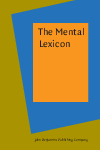
Mental Lexicon
Bridging Cognitive Neuroscience and Linguistic TheoryMental Lexicon is a leading academic journal published by JOHN BENJAMINS PUBLISHING CO that spans significant interdisciplinary terrains including Cognitive Neuroscience and Linguistics. Since its inception in 2006, the journal has gained a prestigious reputation, currently holding a Q1 tier in Linguistics and Language and a Q3 rating in Cognitive Neuroscience based on 2023 categorizations. With impressive Scopus rankings—247 out of 1088 in Language and Linguistics and 94 out of 115 in Cognitive Neuroscience—it serves as a critical platform for the dissemination of innovative research and theoretical advancements in mental lexicon studies. The journal fosters an environment for scholars, researchers, and students to explore the complexities of language processing and cognitive functions, thereby contributing to the realization of our understanding of the mind and language. While Mental Lexicon operates under closed access, it remains an essential resource for those seeking to delve into the intricate relationship between linguistic capabilities and cognitive processes.
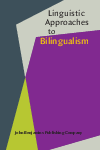
Linguistic Approaches to Bilingualism
Unraveling the Complexities of Language and CognitionLinguistic Approaches to Bilingualism, published by John Benjamins Publishing Co, stands as a leading journal in the field of linguistics, particularly recognizing the complexities and nuances of bilingualism. Established in 2011, this journal has quickly risen to prominence, achieving a Q1 ranking in Linguistics and Language as of 2023, underscoring its impact and relevance within the academic community. With an impressive Scopus ranking that places it in the top 12% and 13% in the Arts and Humanities and Social Sciences categories respectively, it is an essential resource for researchers, professionals, and students alike. The journal aims to publish innovative and interdisciplinary research that contributes to a deeper understanding of bilingual language processing, acquisition, and usage, making it invaluable for those studying the interplay of language and cognition. Although it does not currently offer open access options, its rigorous peer-review process ensures that each publication meets the highest academic standards, fostering insightful discussions and advancements within the field.